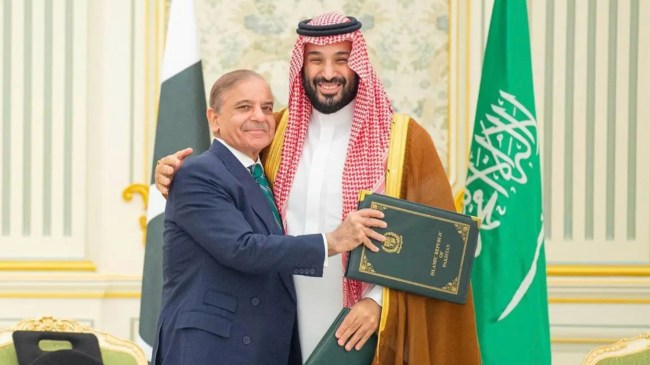Opinion Saudi-Pak defence pact: Can India counter Pakistan’s growing influence in the Muslim world?
The hegemonic Hindu nationalism has negatively impacted India’s secular image in the eyes of the Muslim world and lent credibility to Pakistan’s Muslim card
 Saudi Arabia Crown Prince Mohammed bin Salman and Pakistan Prime Minister Shehbaz Sharif. (Photo: AP)
Saudi Arabia Crown Prince Mohammed bin Salman and Pakistan Prime Minister Shehbaz Sharif. (Photo: AP) Currently, there is a rare chance of any improvement in the relationship between India and Pakistan. But for how long will this deterioration go on? India and Pakistan are not the only antagonistic states in the contemporary world; yet, their animosity is distinctive in several respects. Other examples of adversarial relationships include South Korea and North Korea, China and Taiwan, Iran and Israel, or even the United States and China. Each of these cases offers valuable insights to make sense of India and Pakistan’s relations. When two countries remain disengaged for a prolonged period of time, as exemplified by Iran and Israel, the chances of confrontation between the two increase. Consequently, they tend to depend on a third party for mutual understanding and communication, hence creating opportunities for the third party. This is perhaps the worst possible scenario for India and Pakistan, and they are seemingly heading in that direction.
The recently concluded Saudi-Pakistan mutual defence pact has introduced a new dimension to the future of India-Pakistan relations. Some suggest that it has instigated a paradigmatic shift in the strategic environment in the region, undermining the comparative advantage that India has enjoyed so far. This further indicates that India’s efforts to isolate Pakistan diplomatically have yielded minimal outcomes. Generally, India’s relations with the Muslim world have remained good in recent years. Some of these Muslim countries have even given their highest awards to Prime Minister Narendra Modi. Specifically, India shares a good relationship with Saudi Arabia. If the singular objective of this defence pact is to have backdoor access to nuclear weapons, India could have offered the same to Saudi Arabia. Thus, the question is: Why did Saudi Arabia opt for Pakistan instead of India to have access to nuclear weapons?
It has become unequivocally evident that the Western world does not want any Muslim nation to possess nuclear weapons. The way these powers have dealt with Iran, often through the UN, has made it clear that they want a monopoly over nuclear weapons. From the Iranian experience, Saudi is convinced that having an independent nuclear programme is virtually unattainable in contemporary times. Further, Israel’s recent attack on Qatar signals that the American security guarantee is not infallible. There are also other instances that must have encouraged Saudi to explore this option. For instance, Gaddafi’s Libya, which gave up its nuclear dream in 2003, could not save itself from annihilation. Ravaged by war, Ukraine perhaps regrets its decision to abdicate its nuclear weapons. The fate of countries such as Syria, Iraq, Afghanistan or Libya is a grim reminder for the ruling elites of Muslim nations that the nuclear option is an existential necessity. No one has any idea of what Israeli Prime Minister Benjamin Netanyahu means by the New Middle East. Given this, possession of a nuclear weapon or having access to it acts as a deterrence.
Conversely, Pakistan is the only Muslim nation that has nuclear weapons. Since its early days, Pakistan has tried to play the Muslim card with Muslim nations in order to generate some comparative edge over India, but it was never successful — not even during its worst existential crisis during the 1971 war. The current Saudi-Pak pact has indicated that Pakistan’s Muslim card is working. However, secular India has effectively neutralised Pakistan’s strategy of leveraging its Muslim identity among Islamic nations for an extended duration. Diplomats like Hamid Ansari or the late Syed Shahabuddin or politicians like Salman Khurshid or Asaduddin Owaisi have often played their part in alienating Pakistan in the Muslim world. This is apparent in the composition of global delegations that India sent out after the Operation Sindoor that followed Pahalgam attack. Nevertheless, the hegemonic Hindu nationalism has negatively impacted India’s secular image in the eyes of the Muslim world and lent credibility to Pakistan’s Muslim card.
For India, two conditions are fundamental to improving the relationship with Pakistan. First, it must cease employing non-state actors to unleash terrorism in Indian soil, and second, Kashmir is non-negotiable. For Pakistan, both conditions seem interlinked. What seems to be affecting Indian initiative is the double standards of some of the Western nations on Pakistan’s use of non-state actors against India. Moreover, the rise of Hindu nationalism has made India-Pakistan relations an issue of day-to-day consequences — particularly for average Muslims. The Partition that India’s founding secular leadership thought was a one-time event with limited bearings has proven to be never never-ending cause of tension between the two communities. India must look into its internal politics so that no outsider can exploit it to score goals.
The writer is the author of Shikwa-e- Hind: The Political Future of Indian Muslims, and teaches in Jamia Millia Central University, New Delhi






